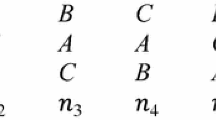Abstract
Recent research has shown that in referendum elections, the presence of interdependence within voter preferences can lead to election outcomes that are undesirable and even paradoxical. However, most of the examples leading to these undesirable outcomes involve contrived voting situations that would be unlikely to occur in actual elections. In this paper, we use computer simulations to investigate the desirability of referendum election outcomes. We show that highly undesirable election outcomes occur not only in contrived examples, but also in randomly generated elections. Our data suggest that the presence of interdependent preferences significantly increases the likelihood of such undesirable outcomes, and that certain alternative voting methods, such as sequential voting and setwise aggregation, hold the potential to produce outcomes that more accurately reflect the will of the electorate.
Similar content being viewed by others
References
Bradley W.J., Hodge J.K., Kilgour D.M. (2005): Separable discrete preferences. Mathematical Social Sciences 49: 335–353
Brams S.J., Kilgour D.M., Zwicker W.S. (1997): Voting on referenda: The separability problem and possible solutions. Electoral Studies 16(3): 359–377
Brams S.J., Kilgour D.M., Zwicker W.S. (1998): The paradox of multiple elections. Social Choice and Welfare 15, 211–236
Hodge J.K. (2002): Separable Preference Orders, PhD thesis, Western Michigan University, Kalamazoo, MI
Hodge J.K., Klima R.E. (2005). The Mathematics of Voting and Elections: A Hands on Approach, volume 22 of Mathematical World Series. American Mathematical Society, Providence, RI
Kilgour D.M., Bradley W.J.(1998). Nonseparable preferences and simultaneous elections. Paper presented at American Political Science Association, Boston, MA
Lacy D., Niou E.M.S.(2000): A problem with referendums. Journal of Theoretical Politics 12(1): 5–31
Author information
Authors and Affiliations
Corresponding author
Rights and permissions
About this article
Cite this article
Hodge, J.K., Schwallier, P. How Does Separability Affect The Desirability Of Referendum Election Outcomes?. Theor Decis 61, 251–276 (2006). https://doi.org/10.1007/s11238-006-9001-7
Received:
Accepted:
Published:
Issue Date:
DOI: https://doi.org/10.1007/s11238-006-9001-7




